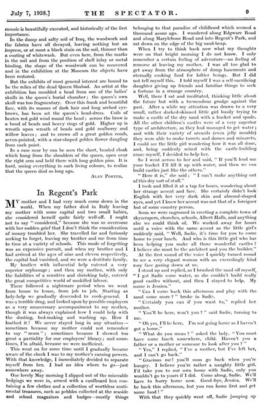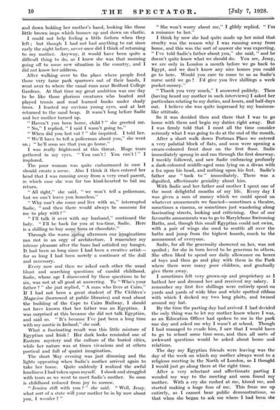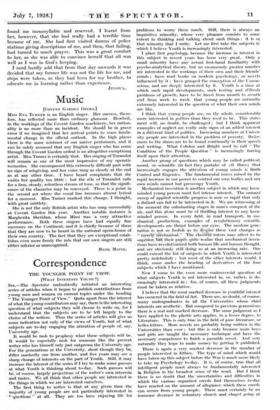In Regent's Park M Y mother and I had very much
come down in the world. When my father died in Italy leaving my mother with some capital and two small babies, she considered herself quite fairly well-off. I ought not to say " considered," because she was so overcome with her sudden grief that I don't think the consideration of money troubled her. She travelled far and furiously seeking to forget, leaving my brother and me from time to time at a variety of schools. This mode of forgetting was an expensive pursuit, and when my brother and I had arrived at the ages of nine and eleven respectively, the capital had vanished, and we were a destitute family. My brother with influential help entered a very superior orphanage ; and then my mother, with only the liabilities of a sensitive and shrinking lady, entered the great competitive world of unskilled labour. There followed a nightmare period when we went from house to house, from job to job. Starting as lady-help we gradually descended to cook-general. I was a terrible drag, and looked upon by possible employers as a very unnecessary accompaniment to my mother, though it was always explained how I could help with the dusting, bed-making and washing up. How I loathed it ! We never stayed long in any situation— sometimes because my mother could not remember to say " mum " ; sometimes because I showed too great a partiality for our employers' library; and some- times, I'm afraid, because we were inefficient. This went on for some time until I gradually became aware of the check I was to my mother's earning powers. With that knowledge, I immediately decided to separate myself from her. I had no idea where to go—just somewhere away. One lovely May morning I slipped out of the miserable lodgings we were in, armed with a cardboard box con- taining a few clothes and a collection of worthless senti- mental treasures, such as pebbles collected at the seaside and school magazines and badges—mostly things belonging to that paradise of childhood which seemed a thousand aeons ago. I wandered along Edgware Road and along Marylebone Road and into Regent's Park, and sat down on the edge of the big sand-heap. When I try to think back now what my thoughts were on that bright morning I do not know. I only remember a certain feeling of adventure—no feeling of remorse at leaving my mother. I was all too glad to get away from the atmosphere of damp basements and eternally cooking food for loftier beings. But I did not tell myself this. I told myself I was a self-sacrificing daughter giving up friends and familiar things to seek a fortune in a strange country. Well, there I sat and meditated, thinking little about the future but with a tremendous grudge against the past. After a while my attention was drawn to a very small, rather darked-skinned little girl busily trying to make a castle of the dry sand with a bucket and spade. All the other children's castles were of a very superior type of architecture, as they had managed to get water ; and with their variety of utensils (even jelly moulds) they were able to make turrets and domes and minarets. I could see the little girl wondering how it was all done, and, being suddenly seized with the castle-building craze myself, I decided to help her. So I went across to her and said, " If you'll lend me your bucket I'll fill it up with water, and then we can build castles just like the others." " Here it is," she said ; " I can't make anything out of this dry sort of stuff." I took and filled it at a tap for hoses, wondering about her strange accent and face. She certainly didn't look English with her very dark skin and almond-shaped eyes, and yet I knew her accent was not that of a foreigner but of some country person. Soon we were engrossed in erecting a complete town of skyscrapers, churches, schools, Albert Halls, and anything else we could think of. We worked, away for hours until a voice with the same accent as the little girl's suddenly. paid, " Well, Sadie, it's time for you to come home to your lunch. And who is this little girl who has been helping you make all those wonderful castles ? I believe she must be the architect and you the builder." At the first sound of the voice I quickly turned round to see a very elegant woman with an exceedingly kind rosy face gazing down at us. I stood up and replied, as I brushed the sand off myself, " I got Sadie some water, as she couldn't build really good castles without, and then I stayed to help. My name is Jessica." " Can I come back this afternoon and play with the sand some more ? " broke in Sadie. " Certainly you can if you want to," replied her mother. " You'll be here, won't you ? " said Sadie, turning to me. " Oh yes, I'll be here. I'm not going home as I haven't got a home." " What do you mean ? " asked the lady. " You must have some lunch somewhere, child. Haven't you a father or a mother or someone to look after you ? " " Yes," I replied, " I've a mother, but I've left her, and I can't go back." " Gracious me you'll soon go back when you're hungry. I believe you're rather a naughty little girl. I'd take you to our own home with Sadie, only you wouldn't go to yours if I did. Come along, Sadie. We'll have to hurry home now. Good-bye, Jessica, We'll be back this afternoon, but you run home first and get some food 1 " With that they quickly went off, Sadie jumping up and down holding her mother's hand, looking like those little brown imps which bounce up and down on elastic.
I could not help feeling a little forlorn when they left ; but though I had not had anything to eat since early the night before, never once did I think of returning to my mother. Anyway, it would have been quite a difficult thing to do, as I knew she was that morning going off to some new situation in the country, and I did not know her address.
After walking over to the place where people feed those very tame park sparrows out of their hands, I went over to where the canal runs near Bedford College Gardens. At that time my great ambition was one day to be like those glorious creatures who boated and played tennis and read learned books under shady trees. I feasted my envious young eyes, and at last returned to the sand heap. It wasn't long before Sadie and her mother turned up.
" Haven't you been home, child ? " she greeted me. " No," I replied, " I said I wasn't going to."
" When did you last eat ? " she inquired. I told her. " We'll have to tell a policeman about you," she went on ; " he'll soon see that you go home."
I was really frightened at this threat. Huge tears gathered in my eyes. " You can't ! You can't ! " I implored.
. The poor woman was quite embarrassed in case I should create a scene. Also I think it then entered her head that I was running away from a very cruel parent, in which case she was far too kind-hearted to bid me return.
" All right," she said, " we won't tell a policeman, but we can't leave you homeless."
" Why can't she come and live with us," interrupted Sadie, " and then there would always be someone for me to play with ? "
" I'll talk it over with my husband," continued the lady. " I'll be back for you at tea-time, Sadie. Here is a shilling to buy some buns or chocolate." • Through the warm string afternoon our iiwaginations ran riot in an orgy of architecture. I remember ,.my intense pleasure after the buns had satisfied my hunger. It had been so long since I had been a creative artist— for so long I had been merely a continuer of the dull and necessary.
Every now and then we asked each other the usual blunt and searching questions of candid childhood. Sadie, whose age I discovered by these questions to be six, was not at all good at answering. To " Who's your father ? " she just replied, " A man who lives at Cairo." If I had not been a great student of The Children's Magazine (borrowed at public libraries) and read about the building of the Cape to Cairo Railway, I should not have known that her father was an Egyptian. I was surprised at this because she did not talk Egyptian, and said so. " It's because I've just been a long time with my auntie in Ireland," she said.
What a fascinating result was this little mixture of Egyptian and Irish ! Her dark looks reminded one of Eastern mystery and the culture of the buried cities, while her nature was at times vivacious and at others poetical and full of quaint imagination.
The short May evening was just dimming and the lights appearing when Sadie's mother arrived again to take her home. Quite suddenly I realized the awful loneliness I had taken upon myself. I shook and struggled with tears as we went to meet Sadie's mother. So soon is childhood reduced from joy to sorrow.
." Jessica still with you ? " she said. " Well, Jessy, what sort of a state will your mother be in by now about yeal, I wonder ? '! " She won't worry about me," I glibly replied. ." I'm a nuisance to her."
I think by now she had quite made up her mind that cruelty was the reason why I was running away front home, and this was the sort of answer she was expecting. " I've told Sadie's father about you," she said, " and he doesn't quite know what we should do. You see, Jessy, we are only in London a month before we go back to Egypt, and we don't know any nice homes you could go to here. Would you care to come to us as Sadie's nurse until we go ? I'd give you five shillings a week pocket-money."
" Thank you very much," I answered politely. Then (having heard my mother in such interviews) I asked her particulars relating to my duties, and hours, and half-days out. I believe she was quite impressed by my business- like attitude.
So it was decided then and there that I was to go home with them and begin my duties right away. But I was firmly told that I must all the time consider seriously what I was going to do at the end of the month. After a short walk down Portman Place we entered a very palatial block of flats, and soon were opening a cream-coloured front door on the first floor. Sadie immediately sprang in and ran through the first doorway. I meekly followed, and saw Sadie embracing profusely a dark-coloured middle-aged man lying on a divan with a fez upon his head, and nothing upon his feet. Sadie's father one " took to " immediately. There was a dignified, affectionate geniality about him.
With Sadie and her father and mother I spent one of the most delightful 'months of my. life.. Every day I was given a sum of money which we could spend on whatever amusements we fancied—sometimes a theatre, Sometimes a cinema, or sometimes just wandering along fascinating streets, looking and criticizing. One of out favourite amusements was to go to Marylebone Swimming Baths, and, though this small Egyptian could not swim, with .a pair of wings she used to scuttle all over the baths and jump from the highest boards, much to the amusement of everyone.
Sadie, for all the generosity showered on her, was not spoiled ; for she in turn loved to be generous to others.
She often liked to spend our daily allowance on boxes of toys and then go and play with them in the Park where there were many poor children, and gradually give them away.
I sometimes felt very grown-up and proprietary as I bathed her and dressed her and received my salary. I remember my first five shillings were entirely spent on yards and yards of wide blue and white spotted ribbon with which I decked my two long plaits, and twined around my hat.
By the time the parting day had arrived I had decided the only thing was to let my mother know where I was, as an Education Officer had spoken to me in the park one day and asked me why I wasn't at school. - Though I had managed to evade him, I saw that I would have to go to school some time soon, and then all' sorts of awkward questions would be asked about home and relations.
The day my Egyptian friends were leaving was the day of the week on which my mother always went to a religious meeting in the North of London, so I thought I would just go along there at the right time.
After a very reluctant and affectionate parting I wended my way to the meeting and soon found my mother. With a cry she rushed at me, kissed me, ana started making a huge fuss of me. This froze me up entirely, as I cannot bear public demonstrations, so that when she began to ask me where -I had been she found me monosyllabic and reserved. 3 learnt from her, however, that she had really had a terrible time because of me. She had first visited dozens of police stations giving descriptions of me, and then, that failing, had turned to much prayer. This was a great comfort to her, as she was able to convince herself that all was well as I was in God's keeping.
I need hardly add that from that day onwards it was decided that my former life was not the life for me, and steps were taken, as they had been for my brother, to educate me in learning rather than experience.
JESSICA.














































 Previous page
Previous page